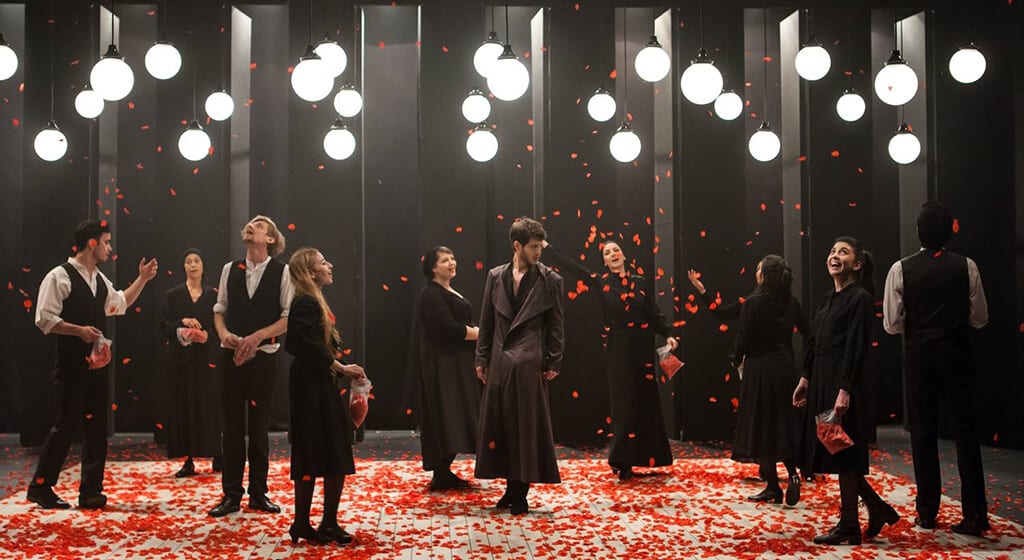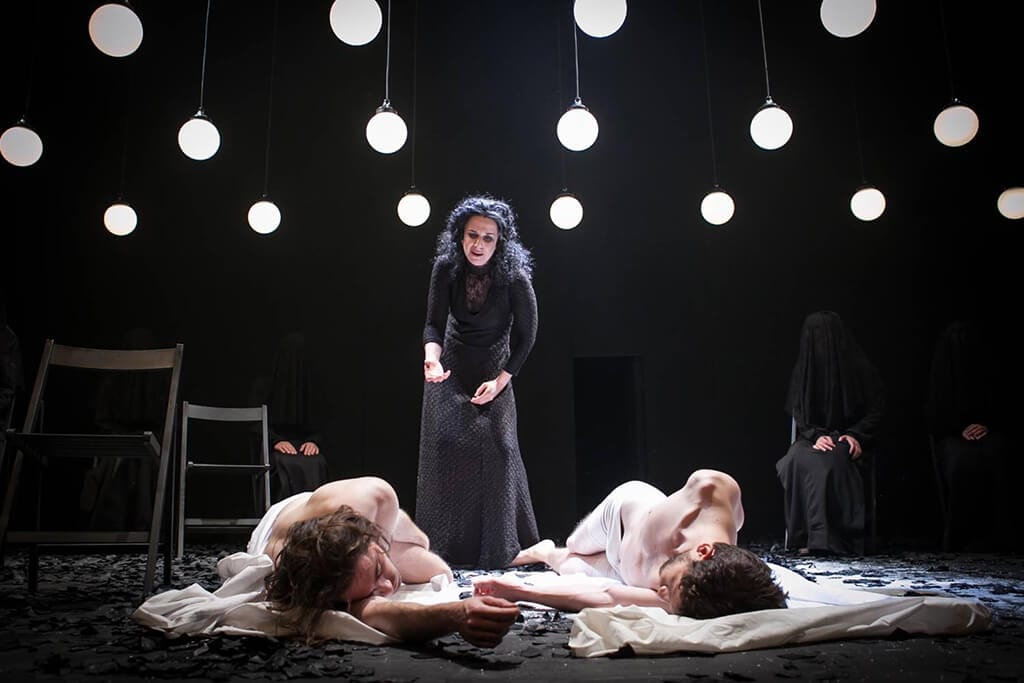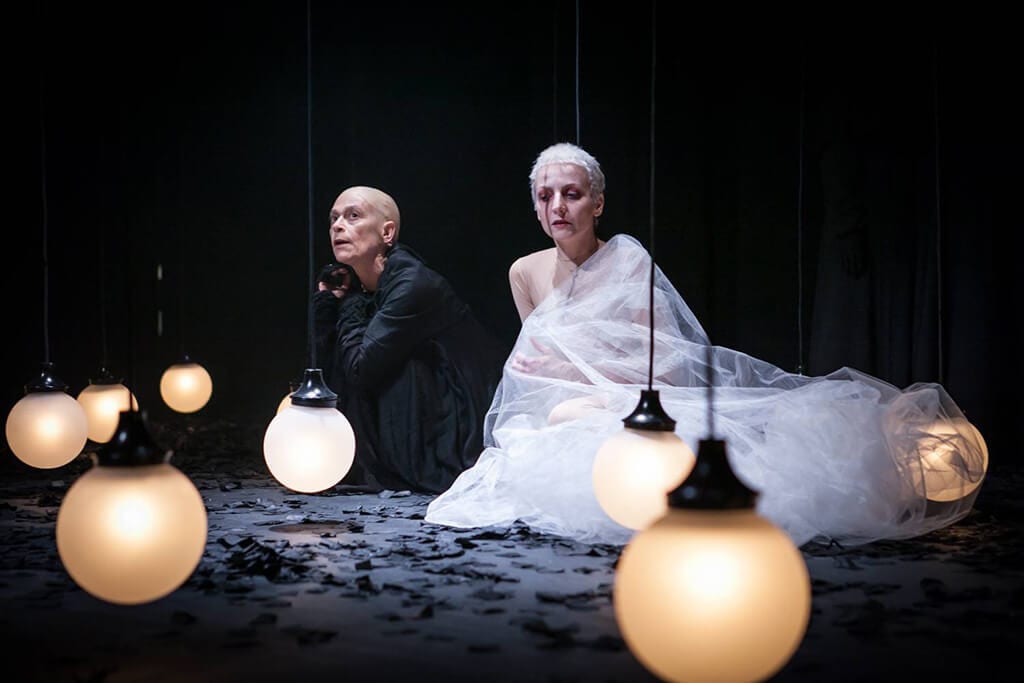Blood Wedding (Spanish: Bodas de sangre) is an astonishing tragedy, written in the 1930’s by the Spanish multi-talented playwright, Federico García Lorca. However, though the play itself is fantastically written, the translation is fine and the directing is as professional and accurate as one could expect from director Kfir Azoulay – there is something, maybe a fixable thing, though – that was not exactly at the usual level I’m used to see in other Azulay’s works.
Lorca was assassinated for his courage to examines non-conformist, sensitive issues, some of which are displayed is the play: women’s social class, wealth versus happiness, the elusive definition of love and bereavement. On the play, a rich mother (Shiri Golan), suffering from the loss of her husband and elder son by stabbers, is concerned about the engagement of her son (Tom Avni) with a lovely young bride (Avigail Harari), who once had a romantic affair with a wild dangerous man named Leonardo (Tom Hagi), now married with her cousin (Zohar Meidan). Leonardo will appear in the couple’s wedding in order to kidnap the bride, who is both attracted and repulsed by him (as about it happens with passionate, risky romances). As expected, the end is extremely tragic. The passage to this end is well decorated, stylized and modeled under the authority of Jehudit Aharon costumes and set elements. Why, then, is it not completely satisfying?
The answer is concealed in the duration of the scenes. It seemed to me as if the play constantly moved from perfection to loss. The beginning, for example, is both captivating and frightening as the black-covered characters appear on stage. Expectations go high as the scene develops,But then the dialogue between Golan and Avni turns to become unpersuasive, as if the actors do not entirely immerse in their roles’ spirit. Moreover, the diction is not as clear as it should be. But then when the long lamps lower slowly form the ceiling and random characters appear from the large, mysterious black doors, once again you will be captured and impressed so much, that the previous un-providing feeling, until the actors sing the lullaby with expressionless and non-dramatic faces.
This impression is not consistent throughout the cast, as every actor has had some greater moments. For example, Golan was very powerful on her scenes of sorrow and grief. Hagi was very powerful as Leonardo, deriving much energy on stage. the transition to the bride’s living room as well as her mother’s conversation with her father (Jonathan Cherchi), are both fantastic, accompanied by the idea of a lady in a black-gown sitting at the back of the stage waving a fan. Additionally, the always-enjoyable Evelin Hagoel (as the maidservant) was excellent. Also, when the moon (Michal Weinberg) sings and as the stage becomes a spine-tingling mix of sparks and darkness, beauty and fear; the scene is entirely captivating. Ora Meirson is a worthwhile typecast when she plays the Death, and makes a dim, strong appearance. Moreover, as Harari enters there is a drastic change, since Harai is not merely an ad actor but a rare, one-of-the-kind one performer who literally spends most of the play crying for her tragic faith, stirring and capturing the audience with her grief. These are the strongest parts of the play.
But then again come those little, hard to define flaws. After a brilliant set-transition into a hall, a forest or a companion house, an actor will burst with an unconvincing weeping. Some organ melody-like tones will irritate the audience being unfit for the situation or the lips of a singer will not synchronize well with the sound. Yes, it is professionally directed, it has nice concepts, ideas and songs, but the difference between the actors’ commitment to the situation projects too much on the outside. This is the Achilles-heel of the play. Still, I do recommend it, because these variable disadvantages can be still tolerated, and well, because of Lorca’s legacy.
“חתונת הדמים” נכת בשנות השלושים, על ידי פדריקו גרסייה לורקה, המחזאי בעל היכולות השמיימיות שנרצח בירייה. לורקה היה ידוע בתעוזתו להציף נושאים קשים ולא קונפורמיסטיים, ואכן, ב’חתונת הדמים’ הוא דן במעמד האישה, הכסף והשכול לבלי מעצורים. יחד עם זאת, הגרסה המבוימת של כפיר אזולאי אינה מספקת את הדעת, וזאת נאמר מפי צופה נלהבת של העבודות של אזולאי לבלי יוצאת מן הכלל. אבל הסיבה, כך אני חושבת, נעוצה ברצף הדרמטורגי שאנו רואים בבמה.
סצנת הפתיחה, למשל. דמויות שחורות חפויות ראש נעות בסחרחרה ומצמררות את הקהל. בימוי מדויק, המייצר אווירה אפלולית ורוגשת. ואז, כאשר האם השכולה, גיבורת ההצגה (שירי גולן) משחקת את סצנת השח עם בנה (תום אבני), משהו חסר. התחושה שמתקבלת היא שמשחקים את הדמויות ולא שהווים אותם. אמנם יש שיפור עם עלייתו של לאונרדו (תום חגי), המאהב המחוצף שאיבד את הכלה (אביגיל הררי הנהדרת) ומתעקש לחטוף אותה מחתונה אחרת ולהשיבה לחיקו; אבל בכל זאת, ישנם פערים בין הכוונות של השחקנים שנוכחותם בולטת.
אף שהדמויות הראשיות כן עושות עבודה טובה בסופו של דבר; גולן מחזיקה מונולוגים מצוינים, הררי נפלאה בכל רגע, הנוכחות הכיפית של אוולין הגואל ויונתן צ’רצ’י מקלה את הקושי שבצפייה בעלילה המעציבה, חגי והררי מדגימים אהבה ותשוקה אמיתיים ומוחשיים; בכל זאת, הנפילה קורית בנקודות הקטנות, הזניחות לכאורה. למשל, כששחקניות המשנה הצעירות מחליפות קריצות על הבמה, והאווירה המקצועה נמוגה לרגע בעבור מי ששם לב. או כשדמות פורצת בבכי ללא סיבה מקשרת ובאופן שאינו בדיוק מהימן.
יש הכל בהצגה של אזולאי: תפאורה ותלבושות מהוקצעים, תנועה נכונה על הבמה, שחקנים טובים ואלמנטים מטריפים (מניפות שחורות, סכינים, מנורות ארוכות המשתלשלות מן התקרה). הסצנות של הירח (מיכל ויינברג) והמוות (אור מאירסון) נהדרות, ולוהקו בטייפ-קאסט טוב. העריכה הלשונית מניחה את הדעת. המוזיקה, ברובה, מתואמת למצב. סך כל הבימוי, כיאה לאזולאי המוכשר, נעשה בקורלציה טובה ובמידה הגונה של ביטוי אישי ויצירתיות, אבל אי-השלמות כנראה נטועה בשוני בין הדמויות על הבמה ביחסיהן עם תפקידן, דבר אשר חורה למתבונן במחזה בעין מזוינת וקשה שלא להבחין בו. בכל זאת, אני כן ממליצה ללכת ולצפות בה. גם כי מדובר בחוויה בימתית מצמררת ומפחידה, גם כי הררי הצעירה תגרום לכל אחד לדמוע בעצב, מרוב שהיא סוחפת רגשית, וגם כי יש שם את כל הדברים הנכונים – ואולי, בהזדמנות אחרת, המופע ימצה את הגלום בו ויהיה מדויק ומשויף כשם שהוא אמור להיות.



